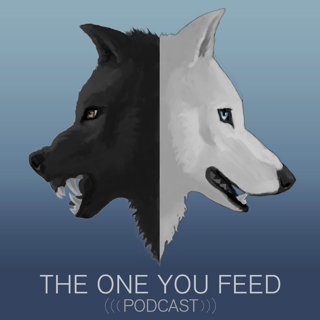
Jessica Hagy
This week on The One You Feed we have Jessica Hagy. She is an artist and writer best known for her award-winning blog, Indexed. A fixture in the creative online space, Jessica has been illustrating, consulting, and speaking since 2006.In This Interview Jessica and I discuss...The One You Feed parable.What is the Happiness Principle.Does the bad wolf look like Brad Pitt or does he look like he has scurvy?What the secret language of graphs and charts looks like.The value of small explorations.Where we can get Leonard Cohen's email address.What is the biggest business virtue you can have in today's world.Why being authentic makes you more interesting.How many good stories are there to every "Chris Hanson have a cookie" stories.How even the very succesful face imposters syndrome.Special Cards from Jessica for The One You FeedDetailed BioJessica Hagy is an artist and writer best known for her Webby award-winning blog, Indexed (www.thisisindexed.com). A fixture in the creative online space, Jessica has been prolifically illustrating, consulting, and speaking to international media and events since 2006.Her work has been described as “deceptively simple,” “undeniably brilliant,” and “our favorite reason for the Internet to exist.” Her style of visual storytelling allows readers to draw their own conclusions and to actively participate in each narrative. “Her images don’t always tell us what to think; quite often, they elegantly offer us ideas to think about.”She mixes data (both quantitative and qualitative) with humor, insight, and simple visuals to make even the most complex concepts immediately accessible and relevant. Her commissioned work frequently appears in various web formats, galleries, books, magazines, newspapers, television outlets, and advertising campaigns.Jessica Hagy LinksHow to be InterestingJessica Hagy homepageIndexedJessica Hagy page at ForbesSee omnystudio.com/listener for privacy information.See Privacy Policy at https://art19.com/privacy and California Privacy Notice at https://art19.com/privacy#do-not-sell-my-info.
16 Jan 201426min

Oliver Burkeman
This week on The One You Feed our guest is Oliver Burkeman. Oliver is a journalist for the Guardian and the author of a wonderful book called The Antotdote: Happiness for People who Hate Positive Thinking. In This Interview Oliver Burkeman and I discuss...The One You Feed parable.Why you should ask yourself: "What is the worst thing that could happen".Do you have a problem right now?.What musterbation is and why you should avoid it.Why positive thinking isn't all it's cracked up to be.Why focusing too much on your goals can be counterproductive.How many wars were started in world history because somebody forgot their coffee in the AM.What pop songs can Oliver not get out of his head.Why positive thinking abhors a mystery.See omnystudio.com/listener for privacy information.See Privacy Policy at https://art19.com/privacy and California Privacy Notice at https://art19.com/privacy#do-not-sell-my-info.
11 Jan 201436min

George Watsky
This week on The One You Feed we have George Watsky. His stage name is Watsky and he is a combination poet, rapper and musician. I first heard him from my kids and found that I enjoyed the music. After I began to listen more closely I realized I was hearing a real and vital artist who has a lot to say.In This Interview Watsky discusses:The One You Feed parablewhy he feels the need to turn his judgement on himselfcoming of age and finding himselfhow he doesn't have all the answers who Norton is his relationship with his parents and what it was like growing uphis work ethichow he handles criticismhis existential crisis at 16how to find meaning, and facing your emotionsSee omnystudio.com/listener for privacy information.See Privacy Policy at https://art19.com/privacy and California Privacy Notice at https://art19.com/privacy#do-not-sell-my-info.
6 Jan 201430min





















